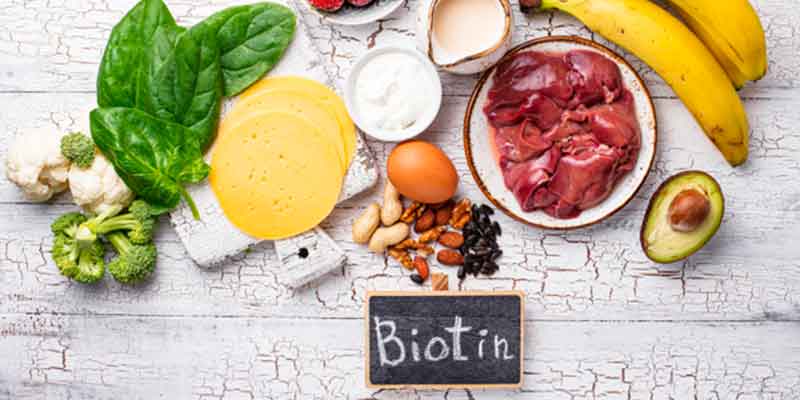Biotin: Benefits, Sources, Dosage, and Side Effects

Introduction
Biotin or Vitamin B7 is a member of the vitamin B complex family. It is a water-soluble vitamin that helps the body metabolize carbohydrates, fats, and protein.
Human cells can not synthesize Biotin, but some bacteria present in the gut wall can produce it, also numerous foods contain this vitamin.
Biotin is important during pregnancy and breastfeeding. It is also essential for the health of your skin, hair, and nails.
In this article, we will tell you everything you need to know about biotin- what is it, how it work, how can it help you, and what are the side effects.
Avertisement
What Is Biotin?
The word ‘biotin’ comes from the Greek word ‘Biotos’ which means ‘life’ or ‘sustenance’. Biotin is also known as vitamin B7, vitamin H (H stands for Haar und Haut, German for ‘Hair and Skin’), Biopeiderm and coenzyme R. As it is a water-soluble vitamin, the body is unable to store biotin and pass the excess through urine.
IUPAC name of biotin is 5-[(3aS,4S,6aR)-2-oxohexahydro-1H-thieno[3,4-d]imidazol-4-yl]pentanoic acid. The chemical formula of these white crystalline needles is C10H16N2O3S.
Many enzymes like carboxylases require biotin to perform their metabolic functions, such as catalyzing the necessary steps in glucose and fatty acid synthesis.
Avertisement
Sources Of Biotin
Biotin is generally found in a wide variety of foods. The best thing about biotin is, it is stable at room temperature and doesn’t get destroyed by cooking.
1. Eggs
Egg yolks contain a high amount of biotin. But egg yolk should be cooked thoroughly before consuming as raw egg white contains dietary avidin that binds with the biotin and our body becomes unable to absorb biotin. Heat separates avidin from biotin and helps the digestive tract to absorb it.
2. Meat and Liver
The liver is a rich source of vitamin B7 or biotin. Kidney and other organ meats are also good sources of this vitamin. Different types of meat like beef or pork contain biotin as well.
3. Yeast
Yeast is a good source of biotin. Nutritional yeast is inactive and generally used to add a nutty or cheesy flavour to food whereas brewers yeast is active and people use it to make beer and bread.
4. Nuts and Seeds
Nuts and legumes are some good sources of biotin. For example almonds, soybean, green beans, peanuts, pecans, and walnuts all contain a moderate amount of biotin.
5. Vegetables
Some vegetables like cucumbers, carrots, cauliflower, avocados, broccoli, sweet potatoes, mushrooms, and spinach contain a rich amount of vitamin B7 or biotin.
6. Dairy
In addition to calcium and other healthy items, milk, yoghurt, and cheese all provide biotin in varying amounts.
Avertisement
Benefits Of Biotin
Biotin has many possible benefits.
1. Helps in Metabolism
Several enzymes that are involved in carbohydrate, fat and protein metabolism need biotin to function properly.
Biotin plays an important role in-
Gluconeogenesis: Gluconeogenesis is a metabolic pathway, that enables glucose synthesis from foods other than carbohydrates, such as amino acids and fats. Enzymes that contain biotin initiate this process.
Synthesis of Fatty Acid: Biotin-containing enzymes are important for the production of fatty acid.
Amino Acid Breakdown: Enzymes that contain biotin help in the metabolism of several important amino acids like leucine.
2. Promotes Hair Health
Biotin promotes healthier and stronger hair and increases hair growth. Though there is little evidence to support this claim, biotin is usually marketed as a treatment for hair loss.
3. Helps During Pregnancy and Breastfeeding
Biotin or vitamin H is very important during pregnancy and breastfeeding. In these stages of life, the body requires a higher amount of biotin. Almost 50% of pregnant women develop mild biotin deficiency and a biotin deficiency at the time of pregnancy causes birth defects.
4. Improves Skin Health
Biotin or Vitamin H improves a skin disorder known as seborrheic dermatitis (cradle cap). People who have a deficiency of biotin may experience red and scaly skin rashes. However, there is no proper evidence that biotin improves skin health in people who don’t have a biotin deficiency.
5. Improves Cracked Nails (Onychorrhexis)
Weak and brittle nails are common conditions that affect around 20% of the world’s population. In the case of biotin deficiency, the nails become fragile and chipped, split or cracked easily. A study suggested that treating biotin-deficient people with 2.5 mg of biotin per day for 2-7 months can improve these conditions.
6. Treats Various Disorders
Biotin is used for the treatment of some genetic disorders and diseases.
Multiple Sclerosis
In a special type of autoimmune disease, the myelin sheath (the protective covering of nerve fibres) in our brain and spinal cord is damaged or destroyed. This disease is known as Multiple sclerosis. Biotin usually produces this myelin sheath. A study suggested that if people with progressive Multiple sclerosis are treated with biotin, they show some degree of clinical improvement.
Treats Biotin-Thiamine-Responsive Basal Ganglia Disease
There is a disorder that affects the basal ganglia (that helps to control our movements) of our brain known as Biotin-thiamine-responsive basal ganglia disease. People suffering from this disorder experience a variety of neurological problems that get worse gradually. As the name suggests, this disease may improve if we treat the patient with biotin and thiamine.
Reduces Diabetes Mellitus
Biotin supplements combined with mineral chromium can reduce blood sugar levels in type 2 diabetes and diabetes mellitus patients. A study suggested that biotin can prevent kidney damage in insulin-dependent type 1 diabetes patients.
Avertisement
Buy Best Biotin Supplements on Flipkart
Avertisement
Required Dosage of Biotin
There is no recommended dietary allowance (RDA) for biotin. Always talk to your doctor first.
The usual dosage of biotin are:
For Adults
- Adults over 18 years need 30 mcg of biotin per day.
- Pregnant and breastfeeding women require 35 mcg of vitamin H or biotin per day.
For Children
- The adequate intake for biotin is 7 mcg for infants (0-12 months).
- Children between 1-3 years require 8 mcg of biotin per day.
- 12 mcg biotin for children between 4-8 years.
- Children between 9-12 years need 20 mcg of biotin per day.
- 20 mcg of biotin per day for children between 9-13 years.
- Children between 14-18 years require 25 mcg of biotin.
Avertisement
Available Forms Of Biotin
Apart from natural sources, biotin is also available as supplement. Biotin supplements are available in 10 mcg, 50 mcg, and 100 mcg tablets.
Always check with a health care provider or a doctor, before taking any biotin supplements.
Avertisement
Deficiency Of Biotin
In humans, biotin deficiency is very rare as biotin is widely available in many foods and our gut bacteria normally synthesize more biotin than our body needs.
Signs of biotin deficiency include –
- Alopecia or hair loss
- Red scale rashes around the eyes, mouth, nose, and genital area.
- Dry eyes
- Lethargy
- Hallucinations
- A numb or tingling feeling in the hands and feet.
- Ataxia or loss of control of bodily movements.
- Seizures
Avertisement
Buy Best Biotin Supplements on Amazon
Avertisement
Causes Of Biotin Deficiency
There are some possible causes of biotin deficiency.
1. Medications
Some medications including anti-seizure and antibiotic drugs may prevent the body from absorbing biotin correctly. Also, some antibiotics destroy the good gut bacterias that naturally produce biotin.
2. Intravenous (IV) Feeding
People who receive nutrition through an Intravenous (IV) injection or tube, can develop a Vitamin B7 deficiency. Doctors usually suggest supplements in this situation.
3. Long-Term Dieting
Sometimes dieting prevents you from getting a wide variety of minerals and vitamins. Eating a balanced diet is essential to get the required amount of biotin.
4. Intestinal Problems
Some chronic intestinal diseases like colitis or Crohn’s disease prevent the body from absorbing biotin and other nutrients from food.
5. Biotinidase Deficiency
Typically the human body recycles biotin and reuses it a few times before it’s eliminated in waste. But people with a rare hereditary disorder (Biotinidase deficiency disorder) can not recycle and reuse biotin.
6. Other Causes
There are some genetic disorders such as holocarboxylase synthetase deficiency, biotin transport deficiency and phenylketonuria cause biotin deficiency in the body.
Avertisement
Side effects of Biotin Supplements
Biotin performs some important functions in our body. Biotin has many benefits, and biotin is relatively safe. Even a high dosage of biotin supplements does not harm the body.
But to some people, a high amount of biotin intake can give a false positive report in laboratory tests for thyroid hormone.
Also Read: Best Biotin Supplement
Avertisement
Frequently Asked Questions About Biotin
1. What are the side effects of taking biotin?
Even a high dose of biotin does not harm the body. As it is a water-soluble vitamin, the excess amount usually passes through urine.
2. What can biotin do for you?
Biotin is essential for carbohydrates, fats, and protein metabolism. Biotin has many health benefits. It promotes skin health and hair growth. It plays an important role during pregnancy and breastfeeding periods.
3. Does biotin grow hair?
Biotin plays an important role in the growth of thicker and healthier hair. It is generally used as a natural hair loss treatment.
4. How much biotin should you take for hair growth?
Though there is no recommended dietary allowance for biotin, taking 2-5 mg of biotin is needed to strengthen the hair.
5. What foods contain biotin?
There are a variety of natural foods such as egg yolk, meat, fish, organ meats, yeasts, vegetables like cucumber, carrots, cauliflower, avocados, broccoli, sweet potatoes, mushrooms, spinach and many more, nuts like almond, pecan, pistachio, etc and milk contain biotin.
6. Does biotin affect thyroid levels?
Biotin may increase thyroid levels, as to some people, a high amount of biotin intake can give a false positive report.
7. Does biotin help with weight loss?
Biotin helps in metabolism, thus it induces weight loss.
8. Can biotin help with acne?
Biotin helps to prevent acne. Generally, acne occurs due to the insufficiency of vitamin B5 or folic acid. Biotin usually prevents skin breakouts.
Avertisement
Conclusion
Vitamin H or Biotin plays a crucial role in the metabolism of fat, carbs, and protein. And maybe it is beneficial for your skin, nails, and hair as well. Pregnant and lactating women need to eat biotin-rich foods to give a healthy birth. You can get biotin from a wide range of natural foods.
For most people, taking biotin supplements is not essential. Always contact your healthcare provider or a doctor before taking any biotin supplements.
Did you find this article helpful? Did we miss anything? Should we add anything more? Don’t forget to tell us in the comment section.




Responses